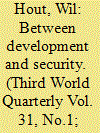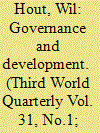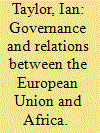|
|
|
Sort Order |
|
|
|
Items / Page
|
|
|
|
|
|
|
| Srl | Item |
| 1 |
ID:
095185


|
|
|
|
|
| Publication |
2010.
|
| Summary/Abstract |
This article focuses on the recent attention in the European Union on fragile states, as expressed, among others, in the European Security Strategy of 2003 and the European Consensus on Development of 2006. Most understandings of the notion of state fragility concern limited state capacity, the inability of institutions to deal with social and political tensions or problems of state legitimacy. The EU is no exception to this general trend of seeing state fragility in terms of governance deficits. Its approach to preventing and responding to state fragility, which was adopted by the European Council in 2007, is being tested in six pilot countries. The article analyses the governance-oriented measures that have been adopted in the Country Strategy Papers (CSPs) agreed between the European Commission and five of the six pilot countries, concluding that there is a profound gap between the political-economic analyses of the CSPs and the support policies implemented by the EU. The approach of the European Commission revolves around attempts to reconstruct state capacities in fragile states through technocratic measures. Fundamental problems of state capture, ethnic relations, human rights violations and extreme inequalities are beyond the purview of policy makers in the European Union.
|
|
|
|
|
|
|
|
|
|
|
|
|
|
|
|
| 2 |
ID:
095178


|
|
|
|
|
| Publication |
2010.
|
| Summary/Abstract |
This article suggests that EU governance in Southeastern Europe reproduces a discourse in which the failures and problems which have emerged, especially in relation to the pace of integration and the sustainability of peace in candidate member states such as Bosnia-Herzegovina, have merely reinforced the EU's external governance agenda. On the one hand, the limitations of reform have reinforced the EU's projection of its power as a civilising mission into what is perceived to be a dangerous vacuum in the region. On the other hand, through the discourse of post-liberal governance, the EU seeks to avoid the direct political responsibilities associated with this power. Rather than legitimise policy making on the basis of representative legitimacy, post-liberal frameworks of governance problematise autonomy and self-government, inverting the liberal paradigm through establishing administrative and regulatory frameworks as prior to democratic choices. This process tends to distance policy making from representative accountability, weakening the legitimacy of governing institutions in Southeastern European states which have international legal sovereignty but lack genuine mechanisms for politically integrating society.
|
|
|
|
|
|
|
|
|
|
|
|
|
|
|
|
| 3 |
ID:
095180


|
|
|
|
|
| Publication |
2010.
|
| Summary/Abstract |
A reappraisal of security and economic interests has led to increased engagement by the European Union with Central Asia in the past few years. As a new foreign policy tool the EU adopted a new partnership strategy for Central Asia in 2007. The strategy aims to integrate both interest-based and governance-related policy ambitions. In the two years since the strategy was adopted activities concerning the implementation of good governance-related initiatives are still rather weak. This article discusses the obstacles and prospects for good governance promotion in Central Asia. The prospects for external good governance promotion in stable authoritarian environments are limited. Domestic economic pressure increases the willingness of the Central Asian incumbent governments to enter into international agreements and widens the scope of external good governance promotion. Yet the prioritisation of interest-based policy objectives and the reluctance to employ conditionalities on the part of the EU provide an opportunity for the Central Asian regimes to limit their concessions and feign reforms. Initiatives focusing on grassroots levels appear to be the most promising in terms of the diffusion of ideas of good governance and democracy.
|
|
|
|
|
|
|
|
|
|
|
|
|
|
|
|
| 4 |
ID:
095174


|
|
|
|
|
| Publication |
2010.
|
| Summary/Abstract |
This article reviews the EU's distinctive approach to good governance, based on policy dialogue and incentives, in light of the significant transformations that have occurred in EU development policy since the early 2000s. The argument made here is that only when the EU decided to act as a single actor was it possible to agree on a harmonised approach to good governance. By doing so, the EU sought to promote aid effectiveness and at the same time raise its profile in international politics, thus challenging the leadership of the World Bank and of the USA. It is concluded that not only has the gap between the EU's lofty ambitions and the implementation record remained wide, but also that the search for better co-ordination between European donors has resulted in decreased policy space for developing countries.
|
|
|
|
|
|
|
|
|
|
|
|
|
|
|
|
| 5 |
ID:
095183


|
|
|
|
|
| Publication |
2010.
|
| Summary/Abstract |
This article examines bi-regional governance between the European Union and Latin American and Caribbean countries as a source of social resistance and contestation. The analysis focuses on the contributions of a bottom-up and informal mechanism of litigation, the Permanent People's Tribunals against European Multinationals and Neoliberalism, to cognitive justice and as a challenge to the notion of neoliberal governance. It questions the underlying assumptions regarding global/regional governance and resistance in the literature on international relations and international political economy, and the type of development and regionalism promoted by EU institutions and governments in Latin America and the Caribbean. The article calls for a problematisation of the resistance that is mobilised through the Tribunals, which is not free of tensions but, nonetheless, contributes through practices of cognitive justice to unveiling the fragmented, and hence, contested, nature of EU neoliberal governance for Latin America and the Caribbean countries.
|
|
|
|
|
|
|
|
|
|
|
|
|
|
|
|
| 6 |
ID:
095173


|
|
|
|
|
| Publication |
2010.
|
| Summary/Abstract |
This introductory article to the special issue on European Union, development policies and governance discusses how notions of ('good') governance have come to dominate development discourses and policies since the mid-1990s. The article argues that governance was part of the so-called Post-Washington Consensus, which understands governance reform as part of the creation of market societies. Although academics have commonly emphasised the fact that governance concerns the rules that regulate the public sphere, the dominant understanding of (good) governance in policy circles revolves around technical and managerial connotations. The second part of the article introduces some important features of EU development policy, and argues that this is essentially neoliberal in nature and favours a technocratic approach to governance reform. The EU's main instrument in relations with developing countries is the Country Strategy Paper, which includes a set of governance indicators for the assessment of the political situation in partner countries. In addition, the European Union has developed a 'governance profile', which consists of nine components.
|
|
|
|
|
|
|
|
|
|
|
|
|
|
|
|
| 7 |
ID:
095177


|
|
|
|
|
| Publication |
2010.
|
| Summary/Abstract |
The New Partnership for Africa's Development (NEPAD) was launched in 2001 as the pre-eminent vehicle to promote Africa's recovery. Initially it was enthusiastically promoted by a select number of countries in Africa, as well as by key members within the G-8. The European Union was active in its support, particularly vis-a-vis governance issues, stating that the EU 'finds that Africa's development efforts are best served by a greatly sharpened focus on NEPAD as the basis for partnership between Africa and the international community'. However, there have been significant problems facing NEPAD. These revolve around the actual extant political economy and dominant political cultures across Africa, which the technocratic neoliberal agenda of 'good governance' cannot deal with. Furthermore, the rise of Chinese engagement with Africa adds a major difficulty to Brussels' claim to be a key engine in supporting NEPAD's goals regarding governance and development. Indeed, the emergence of Chinese actors in Africa threatens to make much of the EU's policies on governance largely irrelevant, although it is acknowledged that, in the long term, Beijing's policy interests are not served by chaotically ruled states.
|
|
|
|
|
|
|
|
|
|
|
|
|
|
|
|
| 8 |
ID:
095182


|
|
|
|
|
| Publication |
2010.
|
| Summary/Abstract |
The literature on governance has recently witnessed a growing tension between a techno-managerial account of governance and a power-sensitive approach. This article argues that the downgrading of power relations by the techno-managerial approach is significantly problematic and counterproductive. Building on the case of the Euro-Mediterranean Development Bank, the article shows how the EU's articulation of the techno-managerial approach has had serious negative implications. On the one hand, it re-emphasised the embedded long-term power asymmetries that have characterised the EU's general governance attitude relationship with its Mediterranean partners. On the other hand, it compromised the credibility of EU policies in addressing and pressing for further reforms in the Mediterranean region.
|
|
|
|
|
|
|
|
|
|
|
|
|
|
|
|
| 9 |
ID:
095175


|
|
|
|
|
| Publication |
2010.
|
| Summary/Abstract |
Distinguishing between '(good) governance' as a process and an outcome, this article examines both the processes and outcomes of governance in the context of the EU's relationship with ACP states since the adoption of the Cotonou Agreement. The article discusses and assesses a variety of governance mechanisms, including the European Commission's use of the governance concept, Economic Partnership Agreements, manifestations of partner preferences, the European Development Fund, the revision of the Cotonou Agreement, and Fisheries Partnership Agreements. Specific examples of the wielding of each mechanism are assessed based upon two criteria: the extent to which the wielding of the mechanism by the EU is a manifestation of 'good governance', and the extent to which the mechanisms have resulted, or are likely to result, in the sustainable development of and reduction of poverty in ACP countries. The examples are chosen to illustrate contradictions between rhetoric and practice and the consequential negative (actual and potential) impact upon development in ACP states. The article ends with some suggestions for improving the EU's governance processes and their outcomes for development.
|
|
|
|
|
|
|
|
|
|
|
|
|
|
|
|
|
|
|
|
|